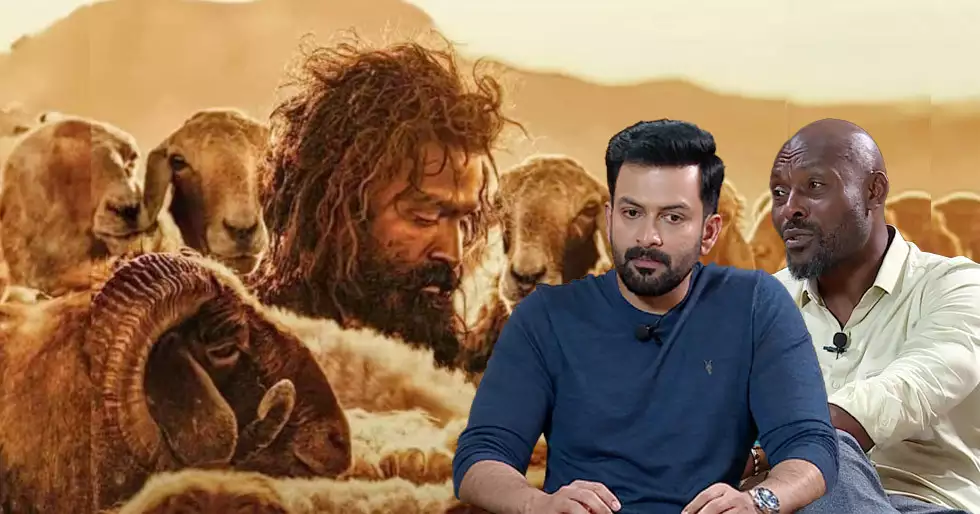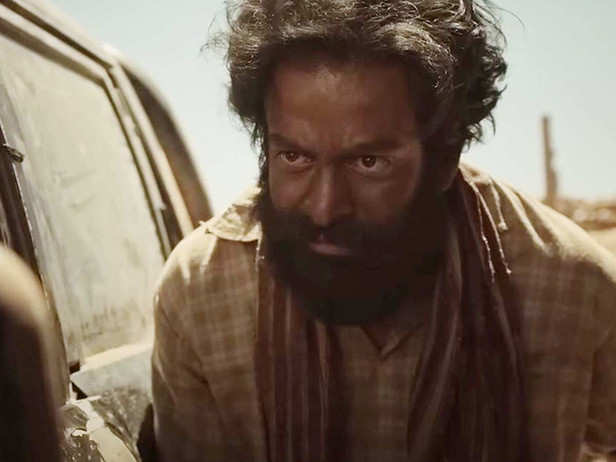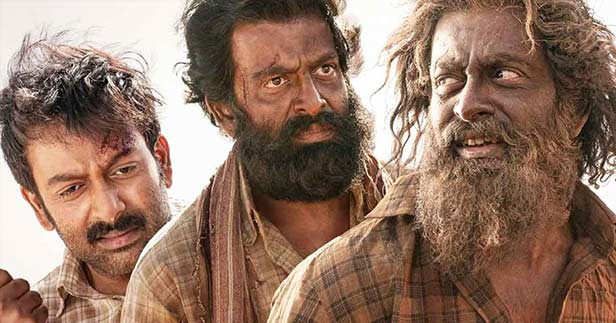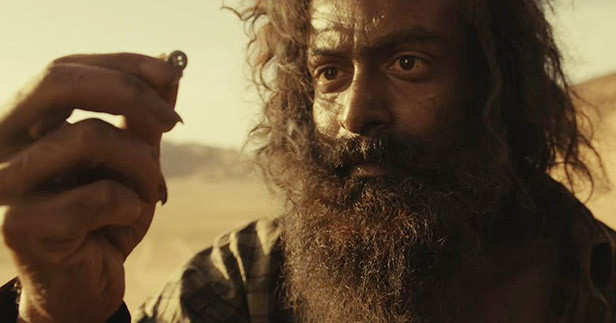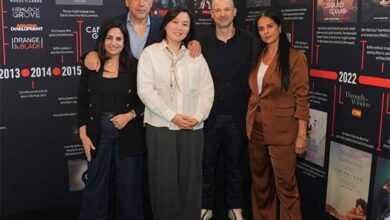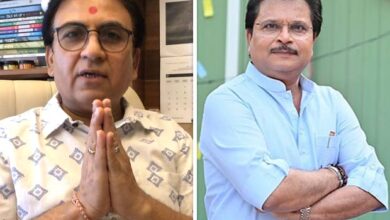The further you go into the run-time of Blessy’s Aadujeevitham or The Goat Life, the harder it gets to recognise Prithviraj Sukumaran. Based on the true story of Najeeb, a Malayali immigrant who is forced to work as a goatherd in the harsh deserts of Saudi Arabia, the film is a sprawling survival drama. Getting into the physicality of the role was as challenging as getting into the headspace for the star and his co-star Jimmy Jean-Louis who plays Ibrahim Khadiri. The process of making the film which included a production halt in Jordan amidst the pandemic required resilience and of course, lots of dedication. After years in development hell, it is finally arriving in cinemas this week.
In an exclusive conversation with Filmfare, Prithviraj Sukumaran and Jimmy Jean-Louis opened up about the making of The Goat Life, showing their vulnerable side to the world and more.
Since this film is about survival, what has your journey of surviving in the film industry been like?
Prithviraj: Much like my character in the film, I believe survival isn’t about existing and stagnating in one particular point of your life. So when you talk about survival, the term makes you think that you’re getting stuck. But survival is actually about movement. And the greatest survivors are always moving. Najeeb was able to survive the ordeal because in his mind he kept moving from one day to the next. So figuratively speaking, it’s all about movement. It could be movement inside your mind or actually manifesting physically.
Jimmy: All my life has been about survival. Going from one country to the next one, just trying to understand what life was about and to understand myself. I think it’s very important to have that ambition of what’s next and how far you can push yourself. Most of the time, you will be challenged by life. Even the worst situations can sometimes be the best for you. Some of my worst stories like potentially being homeless in Paris have been great lessons. Now, I can really draw from those experiences and apply it to my life. So yes, don’t be at ease with your situation.
Prithviraj, what went into that drastic physical transformation for the role?
Prithviraj: When this film came to me in 2009 I immediately knew it involved this process. The story was about the metamorphosis of a man and how the elements play on him. The transformation is pretty much a part of the story. It isn’t for a physical and tangible shock value. How this man changes is part of the narrative. But I surprised myself with how much I was able to do. I put on a lot of weight for the beginning of the movie so that the transformation looks all the more drastic. From there I lost 31 kgs. There is no healthy way to do it. You shouldn’t be losing one-third of your body weight. My doctors told me this wasn’t something they’d ever tell me to do. But I knew for this film I had to. I’m happy with where I got but I can also tell you I’ll never do it again. If there’s a really tempting film that requires me to do that again, I’m going to apologetically refuse saying that I can’t withstand another transformation like that.
Jimmy: That level of dedication is not normal. There’s so much danger attached to that.
How challenging is it to go from tough guy roles to showing your most vulnerable side on the big screen?
Prithviraj: There’s a dichotomy in that question and that’s the beauty of it. I have realised over the years that more often than not, when you see the weakest physical version of a human being is when they’re the strongest. Najeeb at his most frail, was probably the strongest version of himself. Otherwise, he would have given up. In the film, Najeeb who is healthy and plump, is flustered and weak. When you meet him three years later and he can hardly stand up without holding a stick, he’s got a lot of spiritual calmness to him because now he’s mentally strong. As an actor, it is important to understand that being vulnerable doesn’t essentially mean looking vulnerable. Some of the strongest-looking men could be the most vulnerable people you could meet. And some superficially weak-looking men could have immense amounts of strength.

Jimmy: As an actor you try to get into a different character so you forget about yourself. For this character Khadiri, he’s a protector, like an angel, a God-sent person who is there to help and lead someone he doesn’t know, to freedom. That is such a noble thing to do. He’s not doing it for any pay but because it’s the human thing to do. To be able to portray this type of character teaches you that this is what you should be doing in your daily life as well. Sometimes you play roles that teach you real life lessons. That’s how I grow. I learnt a lot about life playing even the weakest characters.
What was your experience of working with Blessy?
Prithviraj: Blessy is one of the most coveted filmmakers of the Malayalam film industry. If you talk to actors from the industry they’ll tell you that one Blessy film is a box that we want to tick off. I’m just lucky because when Blessy decided to make what was his Magnum Opus, he thought I should be the actor playing the central protagonist in the film. The greatest thing about him as a filmmaker is that he has such deep conviction about the way he wants to narrate a story. He just holds on to it with absolute strength. Otherwise it would be impossible to pull something off with all the challenges this film faced. A weaker man, let alone a filmmaker would’ve let go and lost sight of the vision. But he never did through the 16 years of its making. There wasn’t a single moment of compromise. That’s awe-inspiring. I’m just privileged to be a part of it.
Recently, SS Rajamouli said that the Malayalam film industry has “better actors”. What do you have to say about that?
Prithviraj: I take this compliment from the legend with all humility. But I also think that there are great actors everywhere. Maybe at the moment, us Malayalam actors are lucky to have great content available to us to show our craft and skills more regularly and consistently. Great films are being made in Malayalam and I’m very happy. But good actors exist everywhere in the country and in the world. Take Jimmy [Jean-Louis] for example, we wanted an Ibrahim Khadiri and it took us three years. And it was not that Jimmy Jean-Louis was a name readily available to casting agents in India. We went through so many showreels and videos and we found a great actor from Haiti, who has lived in France and the US.
Speaking of great actors in all industries, what does the future of pan Indian films look like to you?
Prithviraj: It’s a very bright future. It’s just the
most natural evolution of the film industry as a whole. Thanks to the exhibition sector evolving with streaming services and TV and YouTube, people now have access to content from all over the world. If someone sitting in Jammu and Kashmir hears about a great Malayalam film they now have a way to see it. Tomorrow I hear of a great Bhojpuri film. There’s a way for me too. Slowly content is travelling everywhere. Hindi has always had an advantage. Now the industries have understood that there needs to be a synergy where we work with each other and for each other. Very soon we’ll just be doing Indian cinema. There are no more “woods”.
Jimmy: I feel so lucky to land this kind of role with these people. I had no idea what I was getting into. To get directed by someone like Blessy. I’ve worked with some of the best directors in Hollywood but to be able to see how meticulous Blessy is and have a co-star like Raj, I was so thankful to be introduced
to the Indian audience.
What were some of the challenges of bringing the film to life after so many years?
Prithviraj: The film came to me in 2009 and we started shooting in 2018. Back then it felt impossible to pull something this big off. The vision was so grand. I don’t think we could mount such an expensive project. Over time things changed. Indian cinema and Malayalam cinema went through a growth spurt. Finally in 2018 it still remained a big risk but we could legitimately think about working on it. But the pandemic happened and the shoot was suspended. We had to go back to Jordan and Algeria and finish it with a year and a half post production schedule. The challenges have been innumerable. The greatest thing was that the entire team always had a final vision. To have the focus to do what we set out to do 16 years ago is what makes it so special.
Prithviraj, you said your daughter has not watched any of your movies. Which is the first film you’ll show her?
Prithviraj: I haven’t shown my daughter any of my films because she’s nine years old right now. If she sees my film, she’s not mature enough to understand that it’s not me. She’ll keep seeing her father on screen and that’ll add a completely different context. But at some point in her life when she’s ready this is a film I really want her to watch. I don’t think I can pick another film from my filmography where I’ve given so much of myself. More importantly at some point in her life she’s going to ask me what does it mean to be an actor? I’ll show her this film and tell her this is what you have to give. It’s a trade off and this is how much you’ll have to commit yourself to your craft.
Lastly, what does being a GOAT mean to you?
Prithviraj: It’s become this Gen Z lingo where it’s used everywhere from sports and cinema. To me, anybody who is trying to be the best version of themselves is a GOAT. Contextually for this film, Najeeb’s life is one of the greatest of all time. For a human being to have lived through the experiences that you’ll see in the movie and to have fought through those experiences and come off the other end and be able to retell the tale so that the world knows about it, is definitely a GOAT move.
The Goat Life is currently in theatres.
